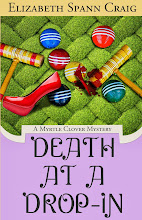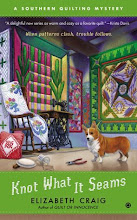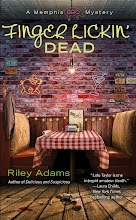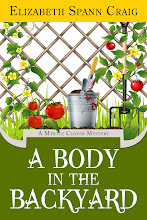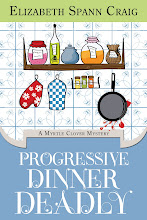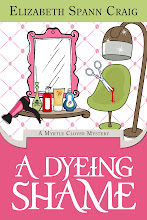 Twitterific links are fed into the Writer’s Knowledge Base search engine (developed by writer and software engineer Mike Fleming)
which has over 19,000 free articles on writing related topics. It's the search
engine for writers.
Twitterific links are fed into the Writer’s Knowledge Base search engine (developed by writer and software engineer Mike Fleming)
which has over 19,000 free articles on writing related topics. It's the search
engine for writers.
Sign up for our free newsletter for monthly writing tips and interviews with top
contributors to the WKB or like us on Facebook.
Mike Fleming is working with author and writing coach
James Scott Bell to offer an online, interactive, writing program to help make
your next novel great. It's called "Knockout Novel" and you can learn
more about it at Knockout Novel.com. Plus, all the data is stored in your Hiveword account
for easy access. The program is due to launch in early-April.
Happy Easter to all
who celebrate!
@Porter_Anderson @DocSyntax @Melissa_Foster
Agent-Assisted Self-Publishing and the Amazon White Glove
Program: http://bit.ly/XMGtQk @Melissa_Foster @JaneFriedman
Templates for self-published books that can be used with
Microsoft Word-created manuscripts: http://bit.ly/YcsBm7 @JFBookman
Bowker's latest pub. data and a look at the importance of
bookstores to publishers: http://bit.ly/YRNYot @Porter_Anderson @DouglasMcCabe
A free directory of cover designers,
formatters, freelance editors, and more: http://bit.ly/nolbXq
The Search Engine for Writers: http://hiveword.com/wkb/search
15 Questions to Help you Decide Your Next
Writing Project: http://bit.ly/WTJIu1
@fictionnotes
Agents share what they like to see in
book openings: http://bit.ly/WTK4RA
@MartinaABoone
3 Ways to Ground Readers in Your World: http://bit.ly/ZY7H7Z @Janice_hardy
How flipping elements of a flipped idea
results in new ideas: http://bit.ly/WTKnvG
@creativesomething
Freelancers: The Magic of Double-Whammy
Headlines: And How To Use Their Enormous Power: http://bit.ly/ZY8cyV
3 Types of "Not Only . . . But
Also" Errors: http://bit.ly/WTKGXg
@writing_tips
Transitioning from fanfic to original
work: http://bit.ly/ZY8xBE @JordanMcCollum
6 Historical Forensic Detectives Who
Deserve Their Own TV Shows: http://bit.ly/WTKQxS
@io9
3 ways back into the author marketing
game: http://bit.ly/162U2jY
To Be a Writer, You Only Need to Do Two
Things: http://bit.ly/11oeZHc
@write_practice
Infinitives: To split or not to split: http://bit.ly/162U77j @aliciarasley
3 Dimensions of Character – A Review of
Larry Brooks' Character Development Technique: http://bit.ly/11ofd17
@Fictorians
1 writer's crazy three years since
"the call": http://bit.ly/162UdMj
@tawnafenske
Understanding Screenwriting: Zero Dark
Thirty, This is 40, Margin Call, & More: http://bit.ly/11ofBwu
@slant
Should Independent Authors Have Their
Books Translated into Foreign Languages? http://bit.ly/ZaMaK5
@goblinwriter
How to Write a Novel as a Collaborative
Team: http://bit.ly/ZKuO5O @adriennedewolfe
5 Unconventional Fantasy Relationships: http://bit.ly/ZHGCEB @rajanyk
Classic Characters Whose Flaws Make Them
Great: http://bit.ly/16dAp9N @BenClayborne
Should Writers Pay to Use Duotrope? http://bit.ly/162Uu1y @writeitsideways
Author Photos Step-By-Step:The
Comprehensive Guide: http://bit.ly/162UE9f
@CharleeVale
Keep the "Cheesiness" Out of
Your Author Website: http://bit.ly/162USgJ
@KerryLonsdale
Authors and Domain Names: Claiming Rights
to Names and Titles: http://bit.ly/11oh4CR
@SheilaJLevine
Killing the "Pay First, Read
Later" E-bookselling Model: http://bit.ly/WWjiaa
@pubperspectives
How Much Can an Editor Edit a Writer's
Work? http://bit.ly/107KvnO @BrianKlems
Scrivener for plotters: http://bit.ly/107KArB @Gwen_Hernandez
How @JaneFriedman Got a 6-Figure Twitter
Following (and Why It Doesn't Matter): http://bit.ly/WWjMNy
Types of act-outs for screenwriters and
other writers: http://bit.ly/107L2Gu
@lillazuck
Filling the creative well with a rest
break: http://bit.ly/WWkWbI
Do You Have a Purpose? The Absurd in
Literature: http://bit.ly/107LQuT
@write_practice
Editors and Their Roles: http://bit.ly/WWlsGI @amazingstories0
Author Solutions: One Racket To Rule Them
All: http://bit.ly/107M7hf @EmilySuess
5 Blogging Tips for Indie Authors: http://bit.ly/WWlO09
In defense of love triangles: www.publishingcrawl.com/2013/02/19/in-defense-of-love-triangles-interests/
@erin_bowman
Dialect in Dialogue: A Little Goes a Long
Way: http://bit.ly/107MqZr @PamelotH
How to Know When to Quit Pursuing
Publication: http://bit.ly/WWmbYt
@jodyhedlund
1 writer advises writers to pick a genre
and stick with it: http://bit.ly/107MFUq
@jimrubart
Defining your characters' dreams: http://bit.ly/WWmB11
Leaving Room for Inspiration/Creativity
Within an Outline: http://bit.ly/WWmVNl
@martinaaboone @AnnaCollomore
5 Essential Qualities of Irresistible
Product Descriptions: http://bit.ly/WWnC9f
@KathrynAragon @buddhapuss
The Five Best Questions To Ask A Panel of
Writers: http://bit.ly/107NBIt @CarrieCuinn
How Writing a Short Story Differs From
Writing a Novel: http://bit.ly/WWouLf
@susanjmorris
What Makes An Idea Worthwhile? http://bit.ly/107Od0O @mooderino
5 Facebook Marketing Tips for Authors: http://bit.ly/W85NTf @goblinwriter
An agent explains when to revise your
manuscript and when to keep submitting: http://bit.ly/16EYbvK
@carlywatters
Build Your Writing Community: In-Person
Events: http://bit.ly/XzjJmN @DIYMFA
Build Your Community--Writing Classes and
Workshops: http://bit.ly/X4KggX @DIYMFA
Build Your Online Writing Community: http://bit.ly/XzjWpZ @DIYMFA
Q&A With An Editor: The Acquisitions
Process: http://bit.ly/X4Krso @DIYMFA
The Author-Editor Relationship: http://bit.ly/Xzk2Ov @DIYMFA
Being Your Own Muse: http://bit.ly/X4KAMB @DIYMFA
What Writers Can Learn from Children's
Books: http://bit.ly/Xzk7Si @DIYMFA
Making Your Writing Real: http://bit.ly/WTJROh @NaAlleyBlog
Using Flow Charts to Plot: http://bit.ly/XzkxrU @jillkemerer
Introducing Your Novel: Why the First Few
Pages are the Most Important: http://bit.ly/X4LmJi
@americanediting
What fiction trends are coming and going?
http://bit.ly/XzkD2I @MacGregorLit
Nail a Better Concept To Empower Your
Story: http://bit.ly/X4Lt7O @storyfix
5 Answers to Questions About Direct
Address: http://bit.ly/XzkFYl @writing_tips
Never again hate self-promo: http://bit.ly/X4LyZ3 @rachellegardner
Worst exposition ever? http://bit.ly/XzkOuI @gointothestory
How do we discover what we want to read? http://bit.ly/XzkQ5Z @byrozmorris
Getting to know readers: the new
accessibility: http://bit.ly/X4LOHw
@tobywneal
5 Tips to Effective Dialogue: http://bit.ly/XzkXON @MaloneEditorial
10 Steps To Write And Publish Your
Non-Fiction Book: http://bit.ly/X4M21x
@thecreativepenn
Developing Scenes--revisiting the plot
arc: http://bit.ly/11og5Ta @DeeWhiteauthor
Think Like a Publisher: Sales Plans: http://bit.ly/107N5Kt @deanwesleysmith
When is it overwritten? http://bit.ly/X4MnRT @juliettewade
Respect Yourself and Take Back Control of
Your Calendar: http://bit.ly/XzliAY
@reallifee
The Best Characters Are Broken: http://bit.ly/X4Mvkb @fcmalby
Pros and Cons of Indie Publishing: http://bit.ly/XzlmRx
The First Step to a Quality Book: http://bit.ly/X4MLQj @JeFishman
Is Scrivener Right For You? http://bit.ly/ZW3jGu @NMusch
What Makes Good Horror? http://bit.ly/YyoTCK @craigdilouie
Journaling for writers: http://bit.ly/ZNb42D @getpulled
6 self-editing tips: http://bit.ly/YypdkS @adriennedewolfe
Focusing your fiction: http://bit.ly/ZNbwho @JordanMcCollum
How your characters might be betraying
readers: http://bit.ly/YyphkG @kmweiland
Winning Battles for Writers: National
Writers Union: http://bit.ly/ZNbSEQ
Many memorable characters are broken
ones: http://bit.ly/ZNbZQQ
Stuck? Five Ways to Write Forward: http://bit.ly/Yypww0
2 Dialogue Tips from Studying SitComs:
Just Spit it Out: http://bit.ly/ZNccmU
@fictionnotes
7 Ways To Improve Your Outlines: http://bit.ly/YypCE0 @goodinaroom
6 Ways To Get Rid Of Infodumps At The
Beginning Of A Story: http://bit.ly/YyqR6g
@woodwardkaren
One key to handling exposition: http://bit.ly/ZNebYr @gointothestory
Write first thing in the morning? Are you
crazy? http://bit.ly/YyqXuG @JennaAvery
Writing for trends: http://bit.ly/ZNctXa @TaliaVance
"Sorry, the short story boom is
bogus": http://bit.ly/ZNeDWN @salon
How to Get the Most Out of a Writing
Class: http://bit.ly/YyrgW4 @michelledseaton
Famous Authors' Fan Letters to Other
Authors: http://bit.ly/ZNfdDN @flavorpill
@theatlantic
8 Tips From @ChuckWendig On How To Read
Like A Writer: http://bit.ly/YyryMR
@woodwardkaren
10 Books that Changed America: http://bit.ly/ZNg1sn @listverse
The Dangers of Reading About Writers: http://bit.ly/Yys6SZ @PeterDamien
A look at the award-winning movie
Lincoln...from a screenwriter's perspective: http://bit.ly/ZNglHE
@cockeyedcaravan
3 Things to Do When You Have to Start
Writing (That Aren't "Start Writing"): http://bit.ly/YysikW
@GeoffreyCubbage
Immaturity in Writing: http://bit.ly/Yysv7M @bluemaven
10 tips for creating great plots: http://bit.ly/107t6dR @plotwhisperer
Point Of View: Enhancing Your Narrative
Voice: http://huff.to/11CdtRZ
Self-editing tips: http://bit.ly/11CdHbJ
Journaling for the Chronic Journal
Abandoner: http://bit.ly/107tjgW @roniloren
For a long writing career, fight for
yourself: http://bit.ly/11Ce1ah
@kristinerusch
Why Being a Ghostwriter isn't as
Soul-Sucking as You Think: http://bit.ly/107tyZs
@BeingTheWriter
How To Be Creative When Your Brain
Doesn't Want To Play: http://bit.ly/107wTrx
@RebootAuthentic
Some thoughts on Authority and
Credibility: http://bit.ly/107wYva
@VeronicaSicoe
Rules of writing fan fiction: http://bit.ly/11ClkPe @charmaineclancy
What 1 writer has learned from her cat: http://bit.ly/11ClmXv @JordanDane
How Busy People Can Find More Time for
Reading: http://bit.ly/11CFadq @jodyhedlund
Worldbuilding--Making the Most of
Holidays in Your World: http://bit.ly/11CFjxi
@juliettewade
Make the Reader Weep or Laugh: http://bit.ly/107HUJj @fictionnotes
What Worries Publishers Most? http://bit.ly/107HX7S @bmorrissey
Facing Failure: The Art of Eating Live
Frogs: http://bit.ly/107Ihnb @jeffgoins
11 Ways to Solve Your Writing
Procrastination Problem: http://bit.ly/107Ik2e
The Future of Publishing for Authors and
Professional Writers: http://bit.ly/107Io28
@wherewriterswin
Blogging Help: 7 Tools For Success: http://bit.ly/11CGEnT @heidicohen
The Basics of DIY E-Book Publishing: http://bit.ly/11CGJYA @writersdigest
How to Get In Touch With Your Characters
(Especially When You Have Writer's Block): http://bit.ly/107IuXt
@write_practice
Flog a Pro: Safe Haven by Nicholas
Sparks: http://bit.ly/11CH4e7 @RayRhamey
10 Important Questions You Should Ask A
Website Company Before Buying A New Website: http://bit.ly/107IHdf
@authormedia
5 Reasons Agents Don't Explain their
Rejections: http://bit.ly/11CHilq
@rachellegardner
A trad. published author tries
self-pubbing. Her one regret: http://bit.ly/11DJdpR
@annvosspeterson
Dialogue Involving Multiple Characters: http://bit.ly/11DJAAG
The Benefits of Talking Through Your
Scenes: http://bit.ly/108ounA @Janice_Hardy
Snip Skimming in the Bud: How to be
Eloquent and Snappy: http://bit.ly/11DJTeK
Judging Young Fiction By Their Covers: http://bit.ly/108oSTb
How To Make A Professional Standard Print
Book Interior: http://bit.ly/108p0lC
@JFBookman @thecreativepenn
A look at the new hybrids in creative
nonfiction: http://bit.ly/11DKywV
5 "Not This . . . But That"
Parallelism Problems: http://bit.ly/108p84s
@writing_tips
Memoir Writing Tips: How To Get Your
Story On The Page: http://bit.ly/11DKLAd
@thewritermama
Discoverability not a problem for
readers...1 reader bribed a librarian to put books in her hold queue: http://bit.ly/108pGau @kimthedork
Guy Kawasaki's 10 Social Media Tips for
Authors: http://to.pbs.org/11DLNMv
@mediatwit
The Business of Screenwriting: Everything
you wanted to know about specs: http://bit.ly/108q5K1
@gointothestory
When it's time to stop blogging: http://bit.ly/11DLYYe @yeomanis
Writing with an "authentic"
voice: http://bit.ly/108r8JZ
@TheHeraldRyanG
Down to Earth Structure: http://bit.ly/11DNkSM @Julie_Gray
Platonic Male-Female Relationships in
Fiction (a.k.a. "The Glue"): http://bit.ly/108rqAz
@fictiorians
Story Structure Provides A Framework For
Meaning: http://bit.ly/11DNwkP
@woodwardkaren













